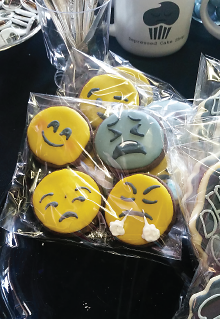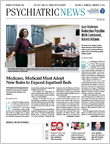Cupcakes, cookies, and cakes are unlikely to be the first images that come to mind when one thinks about depression.
Yet, since its inception in 2013, the Depressed Cake Shop has been using these items and more to foster conversations about mental illness around the world.
Creative director and public relations specialist Emma Thompson established the first Depressed Cake Shop in the United Kingdom to raise awareness that 1 in 4 people will experience mental illness at some point in life.
Her idea was to bake gray-colored cakes and confections with a burst of color as a sign of hope to those facing mental illness and donate the proceeds from the sales to mental health charities.
The mental health advocates and bakers who collaborated to form the first Depressed Cake Shop in the United Kingdom formed a Facebook group, and from there, the concept spread to other parts of the world, with pop-up shops appearing in Scotland, Australia, and India; in this country, there are shops in San Francisco, Los Angeles, Atlanta, Seattle, and Houston, among other places.
Valerie Van Galder, a mental health advocate and hobbyist baker who is in charge of public relations for the Depressed Cake Shop in Los Angeles, told Psychiatric News that many of the people who become involved with the project as bakers have firsthand experience with mental illness or know someone who does. For Van Galder, it was a father with bipolar disorder.
Van Galder was a film studio executive in Hollywood when she learned that her father had bipolar disorder but had kept it a secret from his family. When Van Galder’s mother died, he had a psychotic break, and she took time off from work to take care of him. “It became my mission to help others who were in my position,” she noted, and that included breaking the stigma associated with mental illness.
Van Galder often works with couture cake artist, baker, and mental health advocate Kara Andretta, who also has bipolar disorder.
“My biggest objective is to get people talking and eradicate the stigma surrounding mental illness,” Andretta told Psychiatric News. “The more awareness we spread [about mental illness] and the more stigma we can eradicate, the more we have a chance of reaching people who were previously unreachable.”
Andretta said that it was the stigma associated with mental illness that once deterred her from seeking treatment. “I didn’t want to admit that anything was wrong or talk to a doctor because I was scared of what would happen—I was scared to be branded or labeled.”
Andretta was diagnosed after an episode of severe depression landed her in the hospital 15 years ago.
Last year, she shared the story of her experiences with bipolar disorder at a Depressed Cake Shop event in Los Angeles. Afterward, she said, “many people disclosed their experiences with mental illness to me for the first time in their lives.”
The Los Angeles event was just one of many that Van Galder and Andretta have helped to promote to raise money through the Depressed Cake Shop. So far, the Depressed Cake Shop has raised more than $70,000 for a variety of mental health–related charities, including the National Alliance on Mental Illness and local mental health associations such as the Mental Health Association of Orange County in California.
Said Andretta, “People don’t have a problem talking about cancer anymore, or AIDS—but things like suicide, mental illness, and even depression are still taboo. We aim to change that.” ■
More information about the Depressed Cake Shop can be accessed
here.


